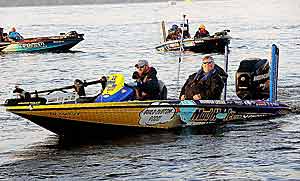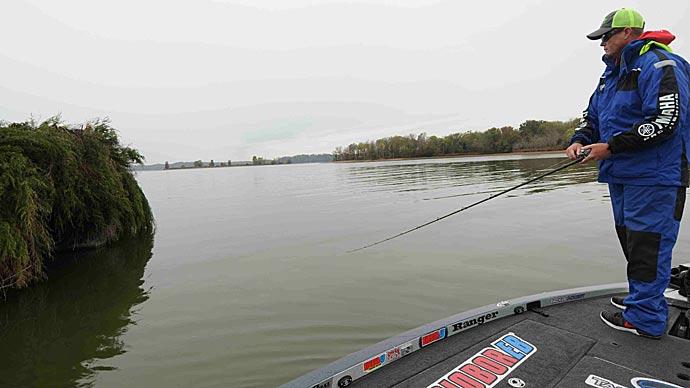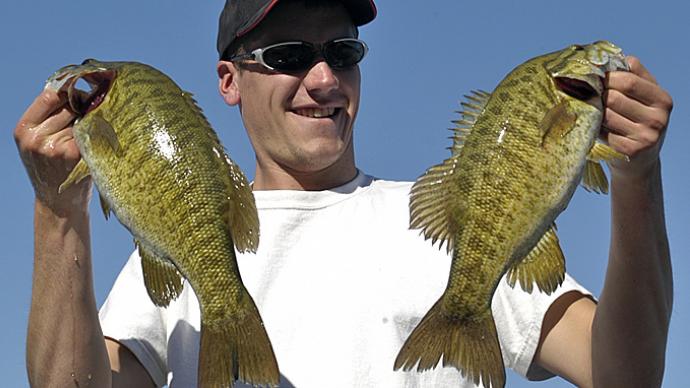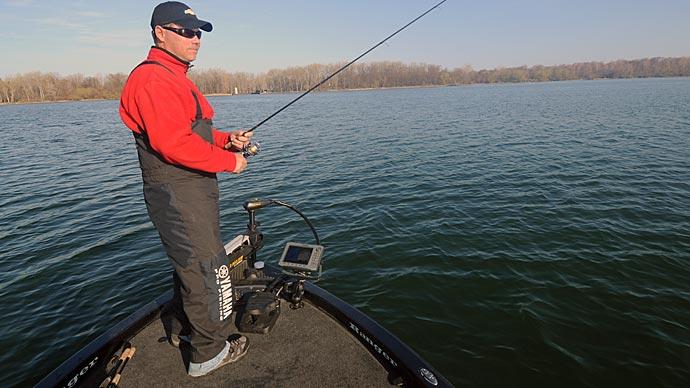
With so much at stake, boaters and co-anglers face new responsibilities in their quest for success and satisfaction on the tournament trail. Veterans of the FLW Tour and Rayovac Series have several years of experience with the Pro/Co-Angler format and its rules. Now, with the format changes in this year's BFL Tournament Trail, veterans and newcomers alike will have to adjust to new rules of engagement in a boater/co-angler format. Notice the absence of the words "pro" and "am." The BFL trail has not gone professional. Only the format has changed. Those in the boater division will compete only against other boaters. And co-anglers will compete only against other co-anglers, who must only fish from the back of the boat. The boater controls the boat's operation and the choice of fishing locations, as well as making any major decisions during the day.
This format has gained tremendous popularity among boat-owning competitors because it offers them more control over their destiny. This feeling arises from the level of effort and expense inherent in boat ownership and tournament competition. The new format also is very popular among co-anglers, for they now can compete on a level playing field against peers rather than against their division's top guns. It all sounds so good. There shouldn't be any problems. Well ...
Especially under this new format, essential issues must be brought to light. Among them are boat-positioning, casting etiquette, and fish netting, to name a few. By addressing these issues and balancing expectations with reality, the coming season will be more enjoyable and successful than ever.
Gas Money
It's not a rule. Under the draw format, it was a custom. Boaters shouldn't expect it in this format, and co-anglers shouldn't feel obligated to offer it. When you enter as a boater, you accept the expenses and responsibilities that go with it. Offering gas money is a fine gesture, but it remains an individual choice based on many factors that should neither be criticized nor judged.
Tackle
True, boats are getting bigger, and designs are more passenger-friendly than ever, but that isn't an open invitation for co-anglers to bring their garage with them. Discuss this with your boater. They may have no limitations, but be prepared. Five rods with versatile actions, including a flipping stick, should be sufficient. Also, one sizeable drawer-style tackle box or soft-sided tackle bag should be adequate. You can scale down if you can get a definite idea of how your boater plans to fish. If not, bring a good variety. The boater often offers you a lure if you do not have something appropriate. Communicate.
Netting Fish
Fortunately, netting is allowed, as landing fish otherwise can be downright dangerous. There is no rule, however, that says one person must net the other's fish. This should be discussed before take-off. Do you both want all fish netted or not at all? Will you call for the net for large or lightly hooked fish only? Not everyone nets fish the same way. A little show-and-tell wouldn't hurt here. Also, during the fighting and landing of a fish, talking out instructions is a good idea. Don't assume that everyone knows how to do it or how you like it done. When a fish is missed or knocked off because of the net, it's an uncomfortable time for both anglers. I've seen bad fish-fighting skills be just as much at fault as bad net jobs. So discuss it ahead of time and come to a clear understanding of this critical issue.
Casting Etiquette
This is an important topic. Somewhat related to the issues of boat positioning and overall fairness, it can make or break an enjoyable, productive day of fishing. The boater will typically get the first and best opportunities at most targets. This can frustrate the competitive, anxious angler in the back of the boat. It can be tempting to eye the next good target and zip a quick cast up ahead of the boat just before the guy up front loads up for his cast. This is not a good idea. The boater has probably spent a great deal of time locating his spots. He deserves the opportunity to work on his game plan. Interfering with that is an excellent way to ensure you get fewer back-seat opportunities. Both of you would like to catch fish and do well. Fairness should be the goal here.
Boat Positioning
The best retrieve keeps the bait in the strike zone for the longest time. This is usually accomplished by paralleling the bank. It can be the most challenging situation for the guy in the back, but you must learn to accept it sometimes. When shoreline fishing, the best and most comfortable cast for both anglers is diagonally ahead at a minimum 45-degree angle. This allows most lures to perform correctly for the duration of the retrieve at normal trolling speeds. Paralleling the bank continuously neither allows this to happen nor is it fair. During spawning season, spending up to an hour trying to entice a big female is not uncommon. If this happens, allow your co-angler several opportunities to catch some bass too. Once again, fairness is the operative word.
Fairness
Fairness. It all comes down to this. Boater and co-anglers both want to do well in their respective standings. Most of the time, the boater controls the co-anglers destiny by their choice of fishing styles. If you are a boater and must parallel the bank or work for a bed extensively, afford enough time in other ways for your passenger. Getting your partner a limit should be just as crucial as getting your own. Indeed, some days are just plain tough, but on good days what good is it to throw back twenty keepers that don't add to your weight while your co-angler has one fish? When you're into a bunch of small keepers, please do everything you can to get your co-angler his limit before leaving to search for bigger fish. Boaters should divulge the presence of underwater cover and allow the co-angler to cast to a piece of cover before speeding away from it. If he's good enough, or lucky enough, to pick off that 3- pounder, then good for him. You should be happy.
Once you've broken the 20-pound mark, another 4-pounder may not help you, but it could catapult your co-angler into the winner's circle. Boaters should want to gain a reputation for being a great "guide," the kind of boater that co-anglers speak favorably of and hope to draw. As an added incentive for boaters to help their co-anglers catch fish, Operation Bass will pay the boater's entry into another Red Man tournament if his co-angler finishes in first place. For boaters, giving the co-angler as many fish-catching opportunities as possible during each tournament will be worthwhile.
Perhaps no other format allows a more significant demonstration of sportsmanship and character than the "boater/co-angler" format. Boaters enjoy more freedom of control and co-anglers enjoy a fairer level of competition. As a result, more anglers will enjoy post-season competition and the rewards that go with it. We have many reasons to celebrate the new opportunities brought about by this format change. We are also responsible for demonstrating fairness, respect, and consideration to those who share our boats. In my experience, most boaters are fair and try to make the day pleasant and successful for the co-angler. Perhaps that's just the reflection of the contagious spirit of a great tournament organization and its fine members.
Content provided by Bass Fishing Magazine, the official publication of FLW Outdoors




